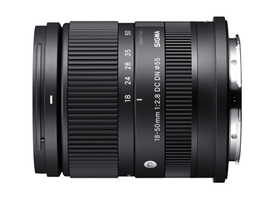Stunning versatility.
A large F2.8 aperture zoom lens that need never leave your camera
This exceptionally small, light and bright standard zoom for crop-sensor mirrorless cameras is the ultimate workhorse lens.
SIGMA’s first APS-C size mirrorless zoom lens has a versatile full-frame equivalent zoom range of 27-75mm, which makes it ideal for a wide range of photo and video applications including landscapes, portraits, street photography, architecture and events. It can also be used for macro-style close-up photography owing to its maximum magnification of 1:2.8, which allows a minimum focusing distance of just 12.1cm. In terms of its bright F2.8 aperture, it makes for easier hand-held low-light shooting and provides a shallow depth-of-field for high-impact results.
Autofocus is exceptionally fast and quiet thanks to the stepping motor, which can be particularly useful when shooting video, or fast-moving subjects such as children and animals. The lens’ exceptionally small and light form factor that weighs less than 300g makes it perfect as a first interchangeable lens for various shooting situations.
The SIGMA 18-50mm F2.8 DC DN | Contemporary is remarkably compact, matching the portability of APS-C mirrorless camera bodies. This makes it a perfect workhorse lens that is ideal for general day-to-day use. The lens is currently the smallest and lightest in its class, boasting a maximum diameter of φ65.4mm, a length of 74.5mm and weight of 290g, yet still maintains a constant aperture of F2.8.
To keep the lens as light as possible, SIGMA constructed the body from carefully selected materials. A polycarbonate called Thermally Stable Composite (TSC) was used for the construction of the barrel, which is sleek, robust, and importantly has a thermal conductivity close to that of aluminium. This ensures stable performance and good operability when used in changing temperatures. By deliberately using metal for some of the internal structure, the parts could be much thinner and have a higher rigidity, ensuring the lens can stand up to frequent, heavy use.

